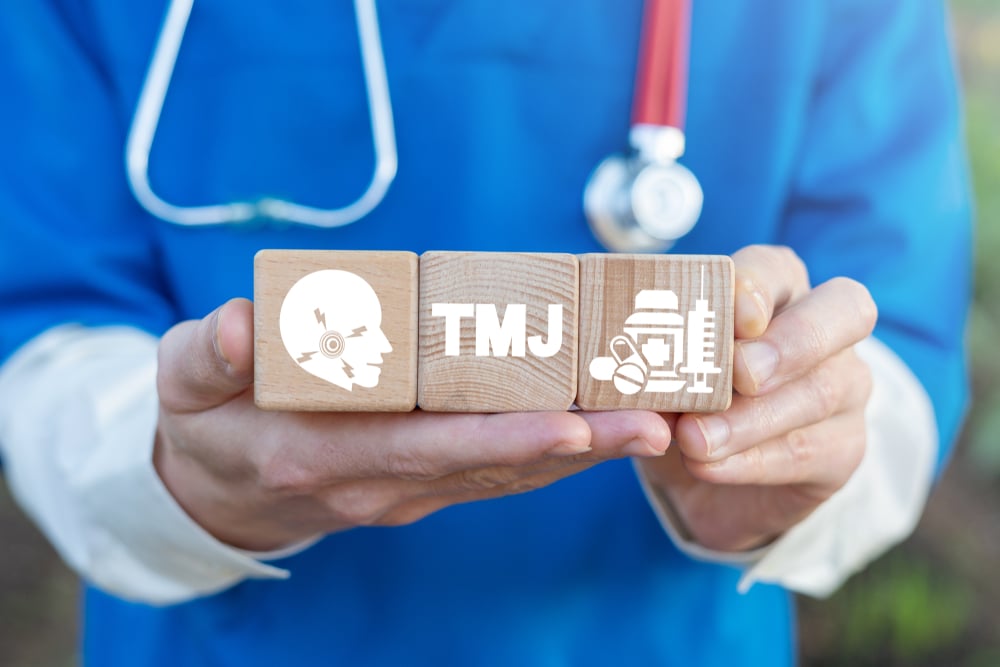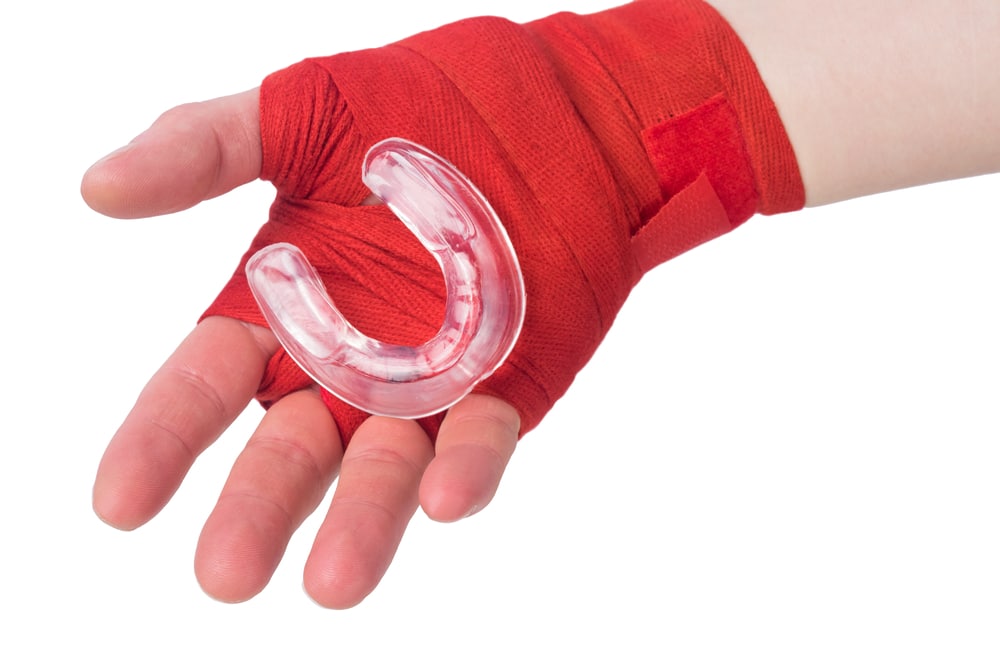Unexplained jaw tightness, facial pain, and headaches can diminish a person’s quality of life. We hear complaints of these and other symptoms all the time. Patients assume that their pain is the result of a dental problem. In fact, it is often caused by inflammation or misalignment in the temporomandibular joints. We genuinely care about our patients and provide gentle, effective treatment that alleviates TMJ pain.

What is TMJ?
TMJ is the term used to describe symptomatic temporomandibular joints. These joints, also referred to as the TMJ, sit on each side of the head. They connect the lower jaw (mandible) to the skull and enable it to achieve various movements, such as opening and closing. The temporomandibular joints are at work, along with muscles and ligaments, in every action we do with our mouths. Each has a ball-and-socket structure, with cushiony discs that help the jaw glide smoothly in its movements. Stress on the joint can degrade or inflame the discs or the muscles and ligaments around the area, resulting in pain.
It is estimated that approximately 12% of the population experiences TMJ at some point. Women are more likely to develop symptoms than men, and most patients are between the ages of 20 and 40. Physical factors that may cause stress on the temporomandibular joints include:
- Arthritis
- Bruxism, grinding or clenching your teeth
- Injury to your jaw, neck, or head
- Misaligned teeth
- Tight facial and jaw muscles
What Causes TMJ?
Temporomandibular joint disorder isn’t an instant problem, such as chipping a tooth. It develops over time. It can actually start during childhood, and this is evidenced by mouth breathing. This points to a misaligned jaw. Those would be congenital causes.
Causes can be related to problems with the bite, but also from subtler issues such as stress and nightly teeth clenching during sleep. Traumatic injury to the jaw joints or related muscles can also lead to TMJ. Some causes of TMJ are still unknown, although research points to a possible genetic predisposition. Here are some causes of TMJ:
- A misaligned bite between the upper and lower jaws
- Grinding or clenching the teeth
- Movement of the soft cushion or disc between the ball and socket of the joint
- Arthritis in the joint
- Stress, which can cause a person to tighten facial and jaw muscles or clench the teeth
- Injury to the jaw, head, or neck impacting the TMJ
- Missing or thoroughly worn teeth creating uneven biting surfaces
Symptoms Of TMJ
Temporomandibular joint disorder is not medically concerning, but it is a condition that can cause chronic symptoms. These can range from mild to severe, affecting one’s daily life. Specific TMJ symptoms include:
- Tenderness in the jaw muscles
- Pain in the jaw or face when chewing or yawning
- Sounds of clicking or popping when moving the jaw
- Headaches
- Ear pain
- Stiffness in the jaw joints that make it difficult to open and close the mouth
- Locking of the jaw in one position, “lockjaw”
How Serious Is TMJ?
Temporomandibular joint disorder is misunderstood or underappreciated by many dentists. This can lead to misdiagnoses of conditions such as migraine headaches or neck and upper back pain. While TMJ is not a condition that is life-threatening or permanently disfiguring, it can have a very serious impact on your quality of life. Chronic jaw pain, headaches, ringing in your ears, and difficulty chewing and biting aren’t issues to shrug off; they merit the full attention of a temporomandibular joint expert such as Dr. Schmitt and our team at our six locations. Why settle for chronic pain and a diminished quality of life?
Does TMJ Get Worse With Age?
Temporomandibular joint disorder is one of the few conditions that is worse when the patient is young. The chronic pain associated with TMJ is most common in younger people, ages 20 to 40. It is more common in women than men.
How We Diagnose TMJ
A complete consultation and evaluation are needed to determine the cause of jaw pain and other symptoms. Your dentist will take a full history of your symptoms, including frequency and severity. X-Rays may be taken to observe the jaw joints and other dental structures. Finally, a complete dental checkup evaluates the jaw for tenderness, clicking, popping, and stiffness.
Treatment options for TMJ
There are several ways to address TMJ pain. Before moving on to more involved treatment, patients may be advised to try the following in an effort to minimize inflammation and stress on the joints:
- Eat softer foods for a short time
- Avoid chewing gum and biting on hard objects like pen caps
- Avoid using teeth to open packages
- Ease pain and stiffness using a heating pad
- Take an anti-inflammatory medication as needed

Conservative remedies may work in some instances of TMJ pain. However, some patients need professional treatment to achieve satisfactory improvement. This, too, is usually conservative. Studies have shown that TMJ pain is often associated with bruxism, clenching and grinding the teeth when sleeping. To reduce the force of this habit on the temporomandibular joints, a dentist can fabricate a custom-fit mouthguard for the upper and lower arches.
Patient testimonial
Read what our patients are saying!
"Great experience as a new patient. The wait time was short. The staff was very friendly and professional. The treatment plan and options for me and my husband were explained in detail so we could make the best decision for us. Thanks to everyone in the office."
Click here to read more reviews.
Can Mouthguards Help With My TMJ?
Night grinding and clenching is often a main factor in TMJ. To combat this, it’s important to put the jaw in the correct position at night. To do this, we fabricate plastic mouthpieces that fit over the upper and lower teeth. These are usually worn at night.
For some patients a mouthguard is all they need to relieve the stresses on their jaw and bite. For others, mouthguards can help, but the bite is too far out of alignment and they require more involved treatment.

What Can Happen If TMJ Goes Untreated?
The symptoms of TMJ may not resolve spontaneously, especially when they are related to ongoing dental stress rather than overuse. This disorder can interfere with daily life by causing chronic pain, even frequent migraine headaches or ringing in the ears. TMJ can disrupt sleep and may lead to sleep apnea or other sleep-related conditions. Due to the relationship between TMJ disorder and bruxism, there is also a concern about excessive and premature wear-and-tear on the teeth. Proper treatment for TMJ can prevent these unwanted consequences.
How To Prevent TMJ From Recurring
In addition to physical factors, TMJ pain may result from lifestyle factors such as excessive gum chewing, poor posture, diet, and stress. Chewing gum constantly throughout the day overworks the jaw, slouching places excess stress on the neck and jaw, and chewing on hard foods makes the jaw and surrounding muscles work harder. That said, stress is the most significant lifestyle factor associated with TMJ. Knowing this, you can implement proper stress-management strategies to help you avoid clenching and grinding your teeth. Suggestions include engaging in relaxing activities like walking, coloring, or gardening. It is also helpful to notice when the jaw is tight and clenched and work on maintaining a more relaxed posture.
Are There Exercises I Can Do To Help Prevent TMJ?
A misaligned bite can lead to TMJ and there’s little you can do about it other than having Dr. Schmitt and our team bring things into alignment. But for other causes, or to prevent a relapse, we give patients these exercises to do at home:
- Relaxed jaw exercise — Place your tongue on the roof of your mouth behind your front teeth. Consciously let your lower jaw relax downward, slightly separating your teeth.
- Goldfish exercises — Place an index finger in front of your ear where your TMJ is located. Put another finger on your chin. Open your jaw either halfway or all the way and feel the slight resistance.
- Chin tuck — Lightly link your hands behind your bottom to push your shoulders forward. Now pull your chin straight back as if you’re trying to create a double chin.
- Jaw resistance — Put your thumb under your chin and create some resistance as you open your mouth. Pinch your chin with forefingers and thumb of both hands to hold it when your mouth is open. Then close your mouth feeling the resistance.
- Tongue up — Hold your tongue up against the roof of your mouth, and then slowly open and close your mouth.
- Side-to-side and forward jaw movement — Place an object that’s about ¼ inch between your front teeth. First, move your jaw slowly from side to side with the object between your teeth. Then do the same thing, but this time move your bottom jaw forward so your bottom teeth are in front of your top teeth.
Is TMJ treatment covered by insurance?
For practitioners who understand temporomandibular joint disorder, such as our team at Schmitt Dental, it’s a no-brainer that TMJ should be covered by insurance. However, for most insurance providers that’s not the case. That’s why when there is coverage, it typically comes from a patient’s medical insurance, not their dental insurance. The reason is that, in their opinion, a joint is a joint anywhere in the body, as are muscles, tendons, and ligaments. Still, where it’s common to cover physical therapy for knee joint rehabilitation, it’s often disputed by the insurance company when that joint is your jaw joint.
At Schmitt Dental, we know treating our patients’ TMJ helps them avoid more involved treatments down the road, but at this point, insurers aren’t on board.
As with any procedure, if you have questions about what may be covered, it’s always a good idea to contact your insurance provider to ask those pointed questions about their coverage.
Schedule Your Consultation in Tennessee Today
At Schmitt Dental, we provide custom dental solutions for problems like TMJ disorder. To learn more, schedule a consultation today.
